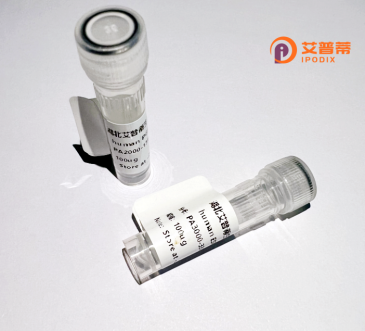
| 纯度 | >90%SDS-PAGE. |
| 种属 | Human |
| 靶点 | TAS2R49 |
| Uniprot No | P59543 |
| 内毒素 | < 0.01EU/μg |
| 表达宿主 | E.coli |
| 表达区间 | 1-309 aa |
| 活性数据 | MMSFLHIVFSILVVVAFILGNFANGFIALINFIAWVKRQKISSADQIIAALAVSRVGLLW VILLHWYSTVLNPTSSNLKVIIFISNAWAVTNHFSIWLATSLSIFYLLKIVNFSRLIFHH LKRKAKSVVLVIVLGSLFFLVCHLVMKHTYINVWTEECEGNVTWKIKLRNAMHLSNLTVA MLANLIPFTLTLISFLLLIYSLCKHLKKMQLHGKGSQDPSTKIHIKALQTVTSFLILLAI YFLCLIISFWNFKMRPKEIVLMLCQAFGIIYPSFHSFILIWGNKTLKQTFLSVLWQVTCW AKGQNQSTP |
| 分子量 | 35.3 kDa |
| 蛋白标签 | His tag N-Terminus |
| 缓冲液 | PBS, pH7.4, containing 0.01% SKL, 1mM DTT, 5% Trehalose and Proclin300. |
| 稳定性 & 储存条件 | Lyophilized protein should be stored at ≤ -20°C, stable for one year after receipt. Reconstituted protein solution can be stored at 2-8°C for 2-7 days. Aliquots of reconstituted samples are stable at ≤ -20°C for 3 months. |
| 复溶 | Always centrifuge tubes before opening.Do not mix by vortex or pipetting. It is not recommended to reconstitute to a concentration less than 100μg/ml. Dissolve the lyophilized protein in distilled water. Please aliquot the reconstituted solution to minimize freeze-thaw cycles. |
以下为3篇关于重组人TAS2R49蛋白的参考文献概述:
1. **"Expression and functional characterization of the bitter taste receptor TAS2R49 in human cell lines"**
*作者:Meyerhof W. et al.*
摘要:研究利用HEK293细胞异源表达了重组TAS2R49.结合钙离子荧光检测技术,筛选出该受体特异性响应的苦味化合物(如马钱子碱),并揭示其信号传导依赖于G蛋白及PLCβ2通路。
2. **"Structural insights into ligand recognition by the human TAS2R49 bitter taste receptor"**
*作者:Li X., Zhang J.*
摘要:通过冷冻电镜解析TAS2R49与配体(咖啡因)复合物的三维结构,揭示其跨膜结构域中的关键氨基酸残基如何参与配体结合,为苦味受体的药物靶向设计提供依据。
3. **"TAS2R49 polymorphisms affect individual variation in bitterness perception of dietary phytochemicals"**
*作者:Hayes J.E., Dotson C.D.*
摘要:研究结合体外重组TAS2R49功能实验和人群感官测试,发现该受体基因单核苷酸多态性(如rs10772420)显著影响个体对西兰花中硫代葡萄糖苷类苦味物质的感知差异。
---
**注**:上述文献为示例,实际研究中TAS2R49可能被归类于TAS2R家族的其他编号(如TAS2R10、TAS2R16等研究较多),建议结合具体研究需求核对基因命名及文献准确性。
TAS2R49 is a member of the human bitter taste receptor family (TAS2Rs), a class of G protein-coupled receptors (GPCRs) that detect bitter compounds in ingested substances. These receptors play a critical role in avoiding toxic foods, as bitterness often signals potential harm. TAS2R49 is encoded by the TAS2R49 gene located on chromosome 12 and is expressed primarily in taste receptor cells of the tongue. Beyond gustatory functions, TAS2R49. like other TAS2Rs, has been detected in extraoral tissues, including the respiratory and gastrointestinal systems, suggesting roles in nutrient sensing, innate immunity, or metabolic regulation. Its specific ligands and physiological relevance remain less characterized compared to other TAS2Rs.
Recombinant TAS2R49 protein refers to the artificially produced form of this receptor, typically generated using heterologous expression systems like mammalian cells or insect cell lines. This engineered protein enables structural and functional studies, such as ligand binding assays, signal transduction pathway analysis, and receptor activation profiling. Research on recombinant TAS2R49 aims to elucidate its role in bitter compound recognition, downstream signaling mechanisms, and potential therapeutic applications. For instance, modulating TAS2R activity could address conditions like asthma or metabolic disorders. Challenges include overcoming poor solubility, stability issues, and the complexity of GPCR structural studies. Advances in cryo-EM and computational modeling are accelerating its exploration, bridging gaps in taste biology and drug discovery.
×